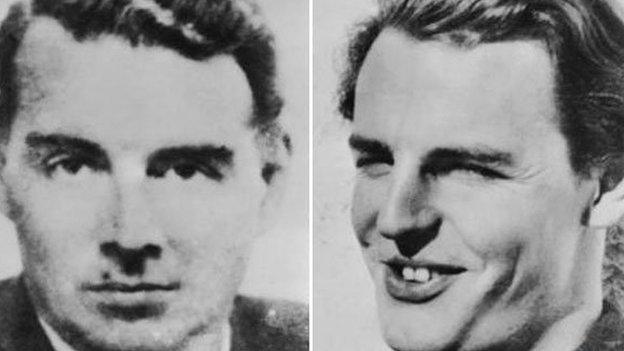MI6 head Maurice Oldfield: The spy boss 'dragged through the mud'
- Published
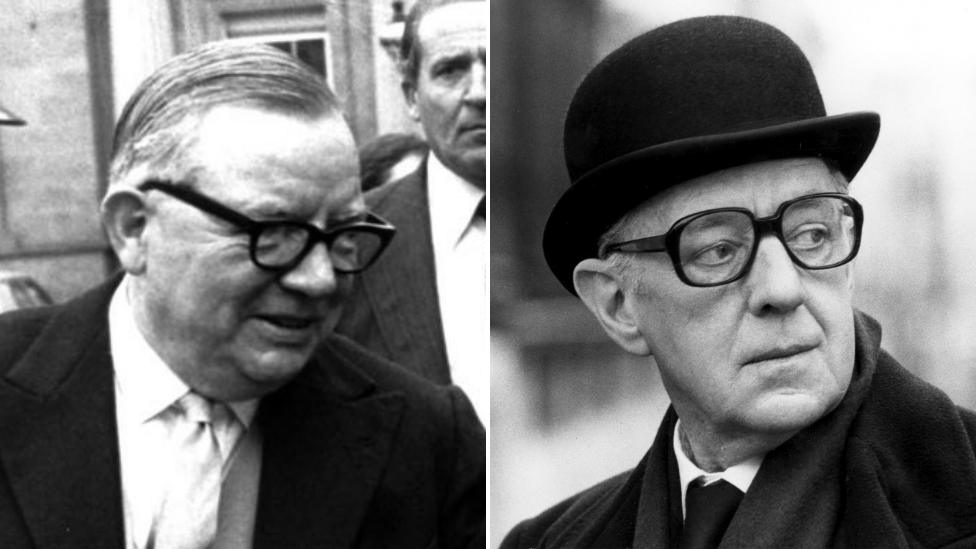
From humble beginnings, Maurice Oldfield (left) was used as the basis for Alec Guinness' character in Tinker Tailor Soldier Spy
Maurice Oldfield rose from humble beginnings to become one of the UK's greatest ever spy chiefs. He was credited with keeping his country out of the Vietnam War - and also inspired Alec Guinness's portrayal of George Smiley in the TV series Tinker Tailor Soldier Spy. Yet allegations of child abuse - later proved to be false - dogged his reputation for years.
These claims - which centred on a children's home in Belfast, where he was stationed in the late 1970s - were only discounted three months ago, 36 years after his death.
His family, who have mounted a posthumous defence for decades, have described the impact as "devastating" and "heartbreaking".
Born on a farmhouse table in Derbyshire, Mr Oldfield had been an unlikely candidate to lead the UK's secret service. Educated at Manchester University, he was an outsider among the elitist, Oxbridge-dominated intelligence services.
Despite this, he enjoyed a stellar career, becoming head of MI6 in 1973 - at a time when the spy agency was reeling after years of Soviet infiltration.
Over six years he stabilised the ship and - just as he was about to retire in 1979 - prime minister Margaret Thatcher asked him to take on one more job, co-ordinating security and intelligence in Northern Ireland.
His time there nearly demolished his legacy.
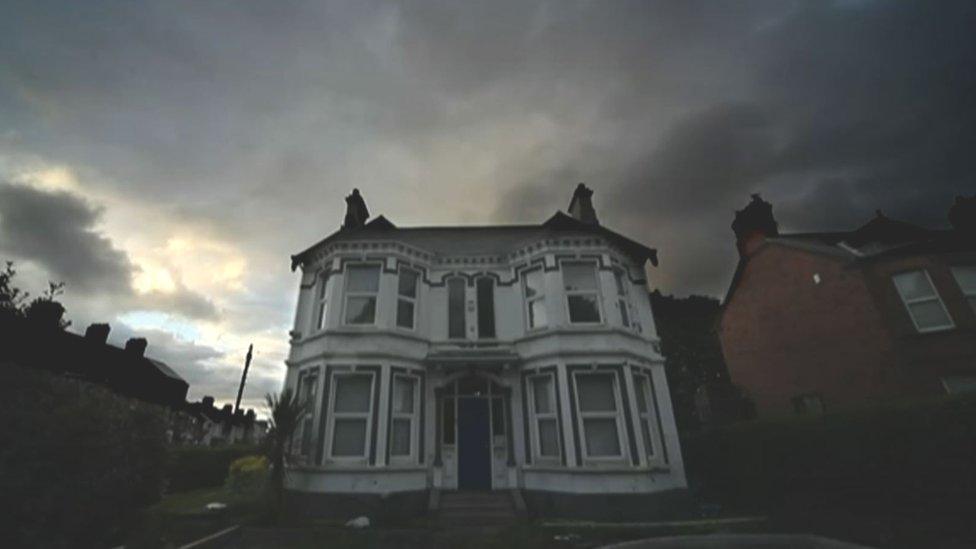
Allegations emerged that Oldfield had abused boys at Kincora children's home
Shortly before he died aged 65 in 1981, rumours began circulating about Mr Oldfield's private life while in Northern Ireland.
It was alleged he had compromised his position by making a pass at a man in a County Down bar. He was also said to have propositioned a man in a Belfast pub toilets.
More seriously, rumours began to emerge connecting him to a boys' home in Belfast, where children had been abused.
These stories began to appear in the newspapers from 1987 and never went away, resurfacing when he was named in the Historical Institutional Abuse Inquiry, external into child abuse in Northern Ireland in 2014.
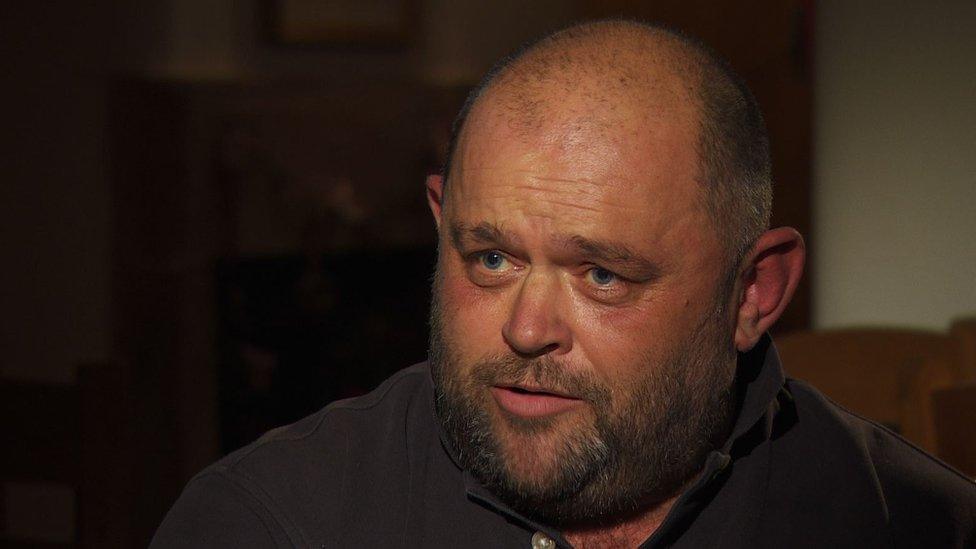
Oldfield's great-nephew, Martin Pearce, had a book published on Oldfield's life last year
He was also named in the Metropolitan Police's Operation Midland inquiry into allegations that a paedophile ring operated in Westminster in the 1970s and 1980s.
The latter inquiry ended in March 2016 with no charges being brought against anyone while the Northern Irish investigation concluded in January that allegations against Mr Oldfield had "no substance".
Mr Oldfield's great-nephew Martin Pearce said the toll on the family over the past three decades had been terrible.
"It was devastating, particularly for his brothers and sisters, most of whom were still alive," he said.
"They never believed any of it but, to see their brother who they had been so proud of being dragged through the press in such a negative way, was heartbreaking."
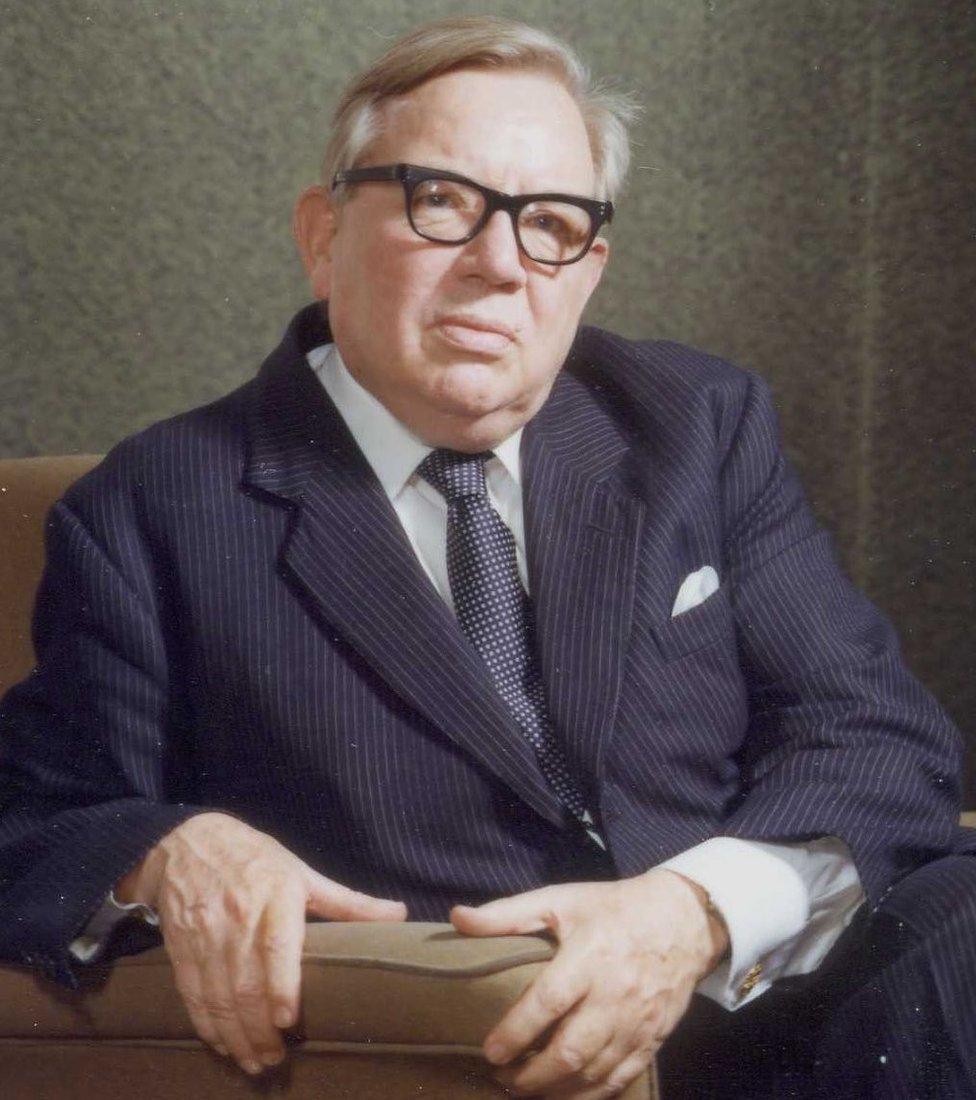
Oldfield was one of the most decorated MI6 leaders
He said the government of the 1980s had refused to defend his great uncle as it was "happy with the distraction" from the Spycatcher affair, in which MI5 agent Peter Wright had alleged the service had operated beyond the law.
"It seems there has been a lot of incompetence over the years that needn't have happened," he said.
"Now Maurice has been fully exonerated we can all move on from that.
"We have always had the absolute confidence and certainty that he was entirely innocent of everything but it's just been horrible to have his name dragged through the mud."
Few of Mr Oldfield's immediate relatives, who tried to defend his name in the years after his death, are themselves still alive. Mr Pearce said it was "frustrating" they are not around to see his name cleared.
Colin Wallace, a whistleblower on abuse in Northern Ireland and an ex-intelligence officer, said he too was angry at Mr Oldfield's treatment.
"It's important to point out he was the most decorated of all our intelligence officers with a track record... second to none," he said.
But smears of that nature can stick, according to MI6 historian Stephen Dorrill.
"There's still a mark against him because of that," he said.
"His role in Northern Ireland was important, he was always looking for a peaceful way out. MI6's role in talking to the IRA actually did save lives."
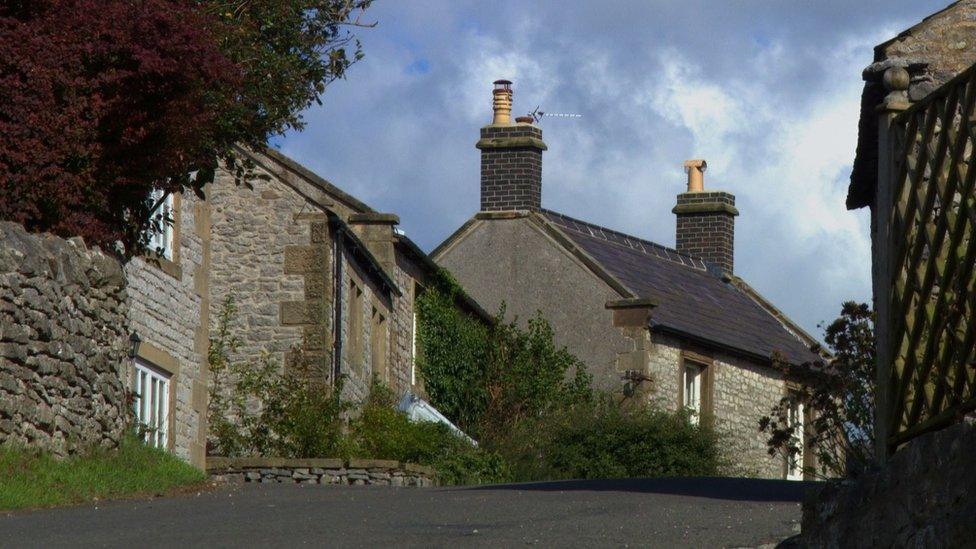
Oldfield liked to return to Over Haddon in the Peak District as often as he could
It was far from the only success in his career.
"Anybody who achieves chief inside MI6 has done exceptionally well because often it's riddled with factions," Mr Dorrill said.
"Coming from Manchester University he would still have been something of an outsider in the service as most came through the Oxbridge route."
MI6 was "in a mess" when Mr Oldfield took over as head in 1973, Mr Dorrill added.
There had been the scandal of the Cambridge Five - the ring of double agents, including Kim Philby and Guy Burgess, who passed hundreds of files to the Russians.
Mr Oldfield managed to gain back the United States' trust in MI6, but perhaps his greatest achievement was helping to persuade the government to stay out of the Vietnam War.
"If Britain had been dragged into that, if [Harold] Wilson had decided to go along with the Americans, that could have been the deaths of many, many young people and he avoided that," said Mr Dorrill.
Oldfield was the first secret service chief to be allowed to appear in the press, which made him something of a reluctant celebrity in the Cold War era.
While preparing to play George Smiley in the BBC adaptation of John Le Carre's Tinker Tailor Soldier Spy, actor Alec Guinness said he wanted to meet a "real spy".
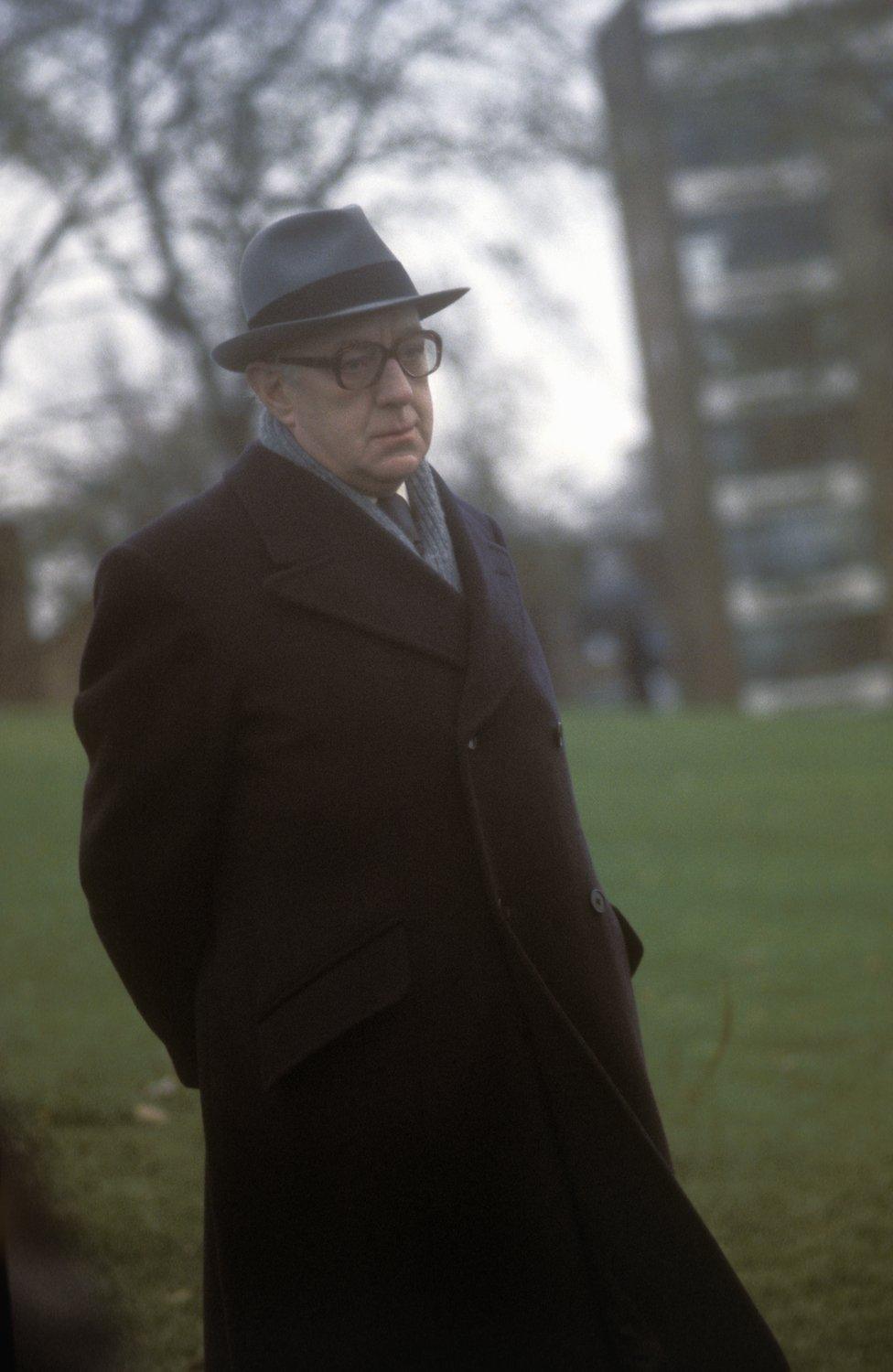
Alec Guinness studied Oldfield's mannerisms for the part of George Smiley
Although Smiley was created some years before he ever met Mr Oldfield, Le Carre did introduce the pair in a London pub.
"Maurice and Alec Guinness got there before him and they were chatting away when John Le Carre arrived," said Mr Pearce.
According to Mr Dorrill, Guinness "observed Maurice very carefully: What he was drinking, how he talked and sat and how he walked down the road."
Le Carre himself said Guinness asked why Mr Oldfield had wiped the rim of his glass during their meeting: "Do you think he's looking for the dregs of poison?" he asked.
"Well if he was, he's dead," Le Carre replied.
Mr Oldfield wrote to the actor after seeing the series, telling him: "I still don't recognise myself."
But many others did.
Inside Out East Midlands is available on the iPlayer.
- Published20 January 2017

- Published21 March 2016
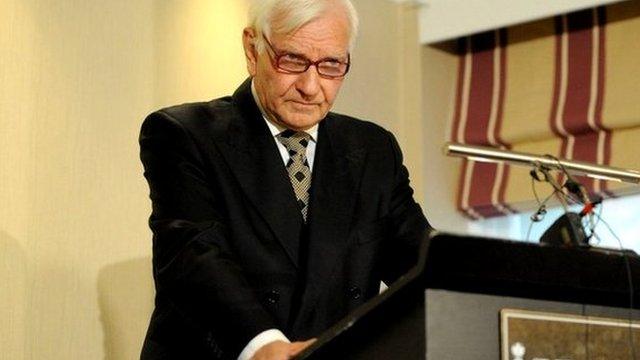
- Published4 April 2016
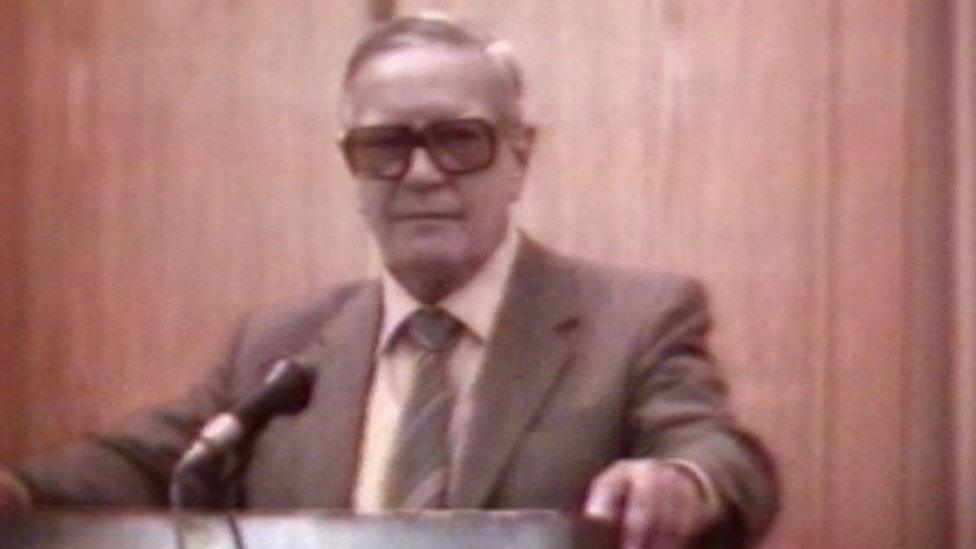
- Published7 July 2014
